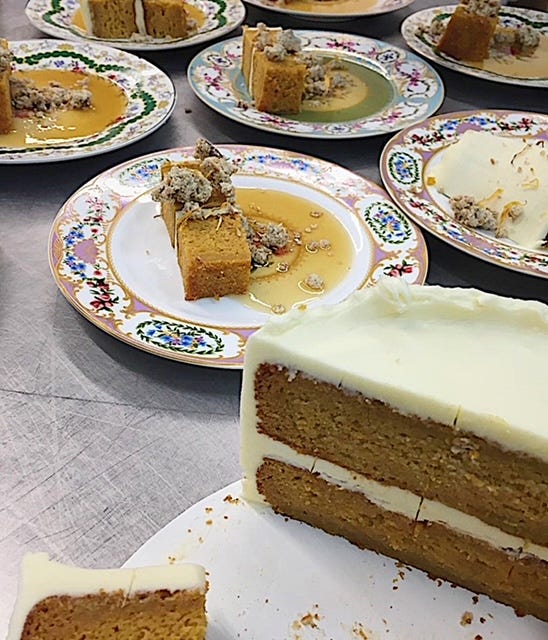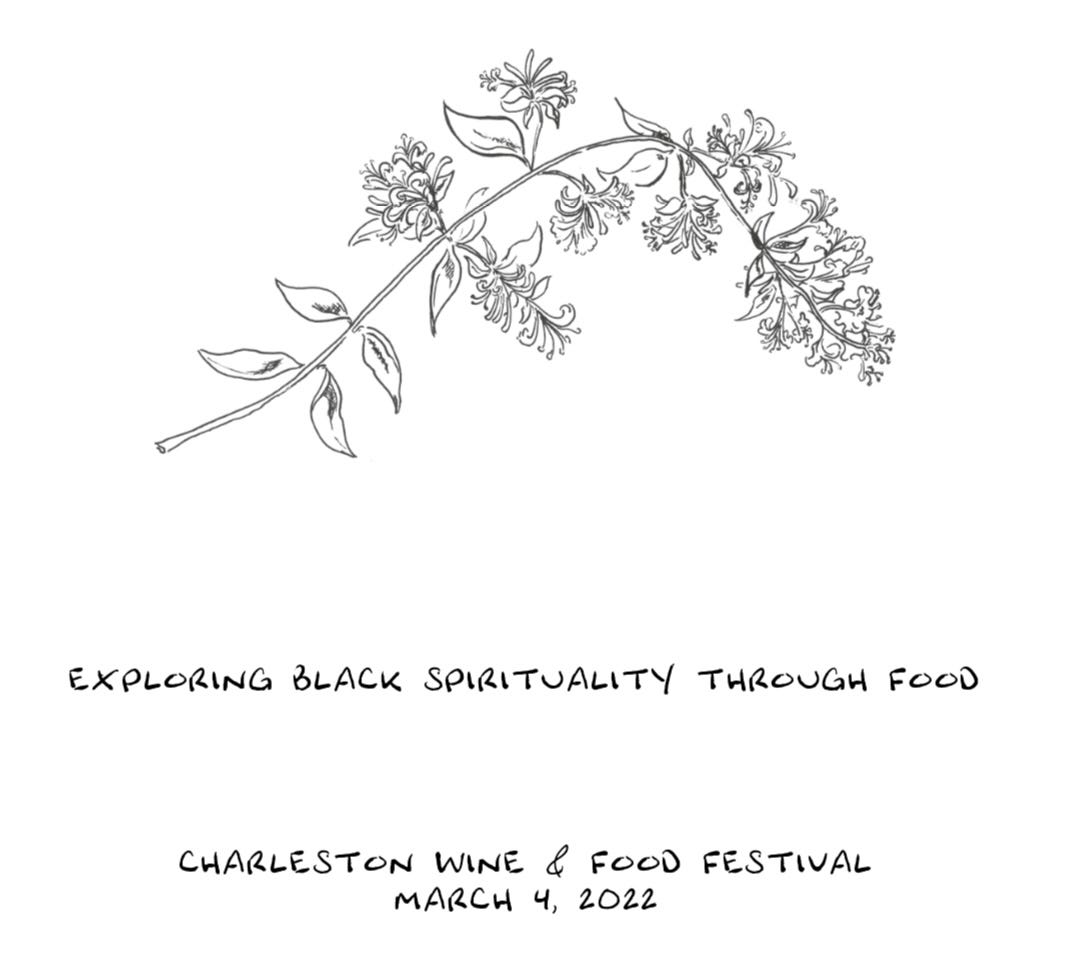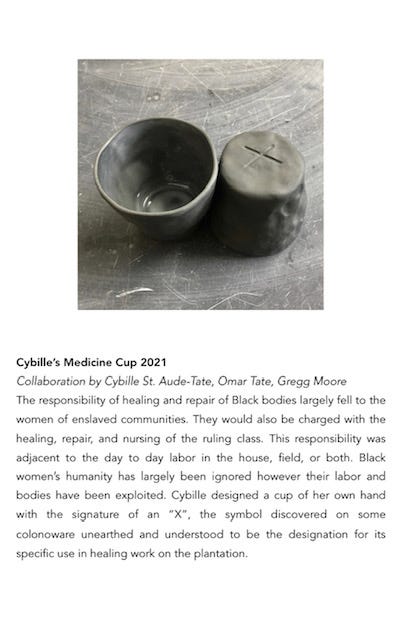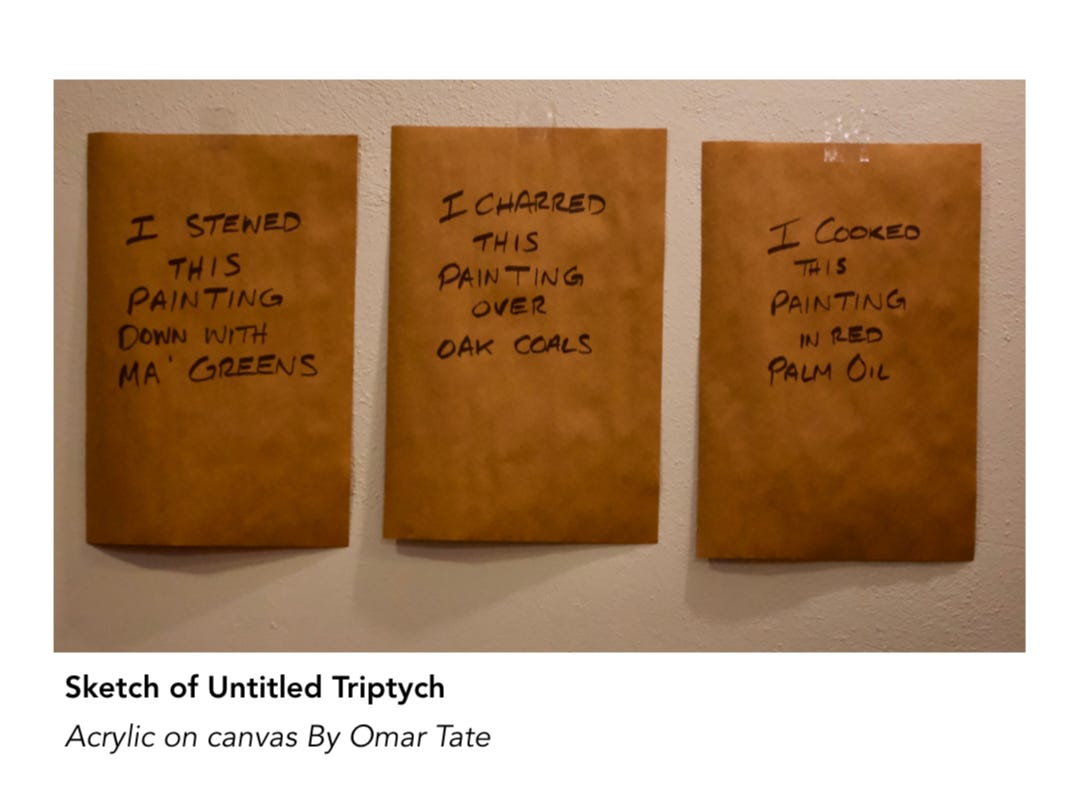Photo by Valerie Erwin
At the very beginning of Dear Science and Other Stories, Katherine McKittrick tells us that the shift from “studying science to studying ways of knowing—has allowed [her] to work out where and how black thinkers imagine and practice liberation as they are weighed down by what [she] can only describe as biocentrically induced accumulation by dispossession. The weight is important here, because it signals not simply a monumental system of knowledge that is fueled by colonial and plutocratic logics, but the weight that bears down on all black people…and puts pressure on their physiological and psychic and political well-being (3).”
I’m interested in Black ways of knowing in and around and through food and through what I call Black women’s kitchen-centered care work (and creativity and transmutation) and what I call deep hospitality (as method). I want to bring critical thinking and self-defined rigor and experimentation and improvisation and imagination and a sense of wonder to my work here—an embodied research that extends beyond the methodologies I learned in academia. We bring this wondrous interdisciplinarity to our kitchen work always and I marvel to witness the ways —subtle and direct— it undoes the hierarchical and compartmentalized logics of Colonial and Plantocratic kitchen traditions.
Dear Science has been a technically challenging read for me, but affirming and encompassing. McKittrick reminds me (us) that “black people have always used interdisciplinary methods to explain, explore, and story the world, because thinking and writing and imagining across a range of texts, disciplines, histories and genres unsettles suffocating and dismal and insular racial logics (4).” The effort is always worth it: her exploration of our collaborative and relational methods helps me recognize and participate in them better.
Omar Tate and Cybille St. Aude-Tate (Honeysuckle Projects) brought the force of their combined experience, wisdom, and creativity—their ways of knowing—to bear in the Exploring Black Spirituality Through Food event for Charleston Wine and Food. They centered Black matriarchal lineages and wisdom. They worked across diasporic modalities and media and disciplines. They foregrounded some through lines but left others for us to discover on our own. It was an overflow of what McKittrick would call black livingness. It was a joy. It was a vibe. All of the ideas, references and citations worked to open a door to a universe of our making: “liberation [as] an already existing and unfinished and unmet possibility (13).”
Their menu as ‘zine was a genius move among so many that evening. It brought original poetry, artwork, prose, quotes from the event’s ur-text, Ntozake Shange’s If I Can Cook/You Know God Can, and of course, the menu into conversation with each other, the altar, Omar and Cybille’s original art work and installations, and the food itself. The way this practice of sharing ideas and stories among us exploded expected kitchen narratives! The way it forged new connections and routes! The way it reflected back to us our expansiveness!
Needless to say, I was happy to participate in the exchange and I am glad to be able to share a few images from the ‘zine along with my essay contribution to it below (‘zine images are the Tate’s. Don’t reproduce without their permission.)
Dessert or, The Sacred as Hidden Hospitality
I have been thinking of concealment and hidden-ness as actively generative strategies of spirit. These are strategies that allow us not just to protect the sacred but also to insist on our sacred, to attend to and behold our sacred, to hold space for our sacred, to create the conditions for our sacred. The content and purpose of a ritual space must be kept secret. So many of our acts and sites of hospitality follow this logic. The deeply hospitable is sacred.
The Napkin
The Black repast comes to mind, but this is not the only occasion whereby a church lady, a cousin, grandmother, auntie, sister or neighbor might insist that you take the slice of cake, the one you can’t see your way to eating now, with you. It’s not a stretch to imagine that the thoughtfulness and care with which they wrap the to-go plate in a napkin is motivated by something beyond mere practicality. We might accept the covered parcel with genuine but first-level gratitude and shove it in the fridge when we get home, forgetting. It is only after a troubled dream startles us awake in the middle of the night, leaving us feeling small and disoriented or after returning home from a long, harrowing day out in a shoving world that we recognize the gift. After re-membering, ritual. Careful unwrapping and reveal. The revelatory: the cake is nourishment, care, energy for ongoing work, a gift from yours reminding you that sweetness is your inheritance. You experience next-level gratitude.
Burnt Honey Hennessy Caramel*
The shrouded, secret hours that transition us from Saturday night to Sunday morning have long been a space of freedom dreaming** and recuperation of spirit. Our public transcripts would emphasize a strict, ideological separation between the sanctity of Sunday morning and whatever communal revelry or magic occurs before. But our hidden transcripts tell another story. Saturday night merry-and magic-making create the conditions for and bring Sunday fellowship into its holiest manifestation.
Malidoma Some reminds us that between the shrine and the people there is a space that represents chaos. A space where disorder must be acted out. This space is sacred. We pour a libation…or two. We dance to burn off that which no longer serves us. We reaffirm our linkages with the divine in each other. Some says: a ritual performed by a community liberates the energy that makes another rite possible.
Secret Gardens
My prayer is that this is a cake that celebrates our totemic ingredients—in this case sweet potato, buttermilk, a thing foraged. That it is a cake that celebrates Black women’s kitchen-centered care work, their powers of transmutation. A cake that celebrates the kitchen as a space of initiation and knowledge transfer. As a space where the unseen are beheld and those gone are present. A space of soul and stomach filling, of holdin’ on together as Ntozake Shange put it. A space where we offer back that which we brought with us. A space to make manna out the air. To survive. This here is different from the conspicuous consumption of Plantation hospitality. We full.
*It will show my age but cue Ludacris’ “Keep It On The Hush”
**With thanks, always, to Robin Kelley
*****
What have you been harvesting? What’s keeping you full these days? xx








monica, I am stuck having 100s of feelings and zero words, after the first couple of readings of this today. I will return to it. It is a gathering and a sermon and a poem.